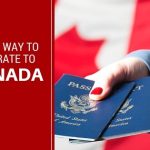Dreaming of a life in Canada? You’re not alone. Many individuals, like yourself, are drawn to the promise of a high quality of life, diverse cultural experiences, and excellent opportunities for personal and professional growth in the Great White North. If you’re a Nigerian considering making the move to Canada, you’re in for an exciting journey. In this comprehensive guide, we’ll break down the key steps, requirements, and considerations to help turn your dream into a reality.
Understanding the Canadian Immigration System
Canada’s immigration system is known for being one of the most welcoming and inclusive in the world. The process, however, can be complex, and it’s crucial to familiarize yourself with the various immigration programs available. The two main categories to explore are Express Entry and Provincial Nominee Programs (PNPs).
Express Entry is a points-based system that assesses candidates based on factors such as age, education, work experience, language proficiency, and adaptability. The Comprehensive Ranking System (CRS) determines the points awarded, with candidates ranked against each other. The highest-scoring individuals receive invitations to apply for permanent residence.
Provincial Nominee Programs, on the other hand, allow provinces and territories to nominate individuals based on their specific needs and priorities. Each province has its own set of criteria, so researching and identifying the most suitable province for your skills and preferences is essential.
English Language Proficiency
Proficiency in English is a key factor in the Canadian immigration process. To demonstrate your language skills, you’ll need to take an approved language test such as the International English Language Testing System (IELTS) or the Canadian English Language Proficiency Index Program (CELPIP). Achieving a competitive score will positively impact your Express Entry profile and increase your chances of being selected.
Educational Credentials Assessment (ECA)
If you completed your education outside of Canada, you’ll need to undergo an Educational Credentials Assessment (ECA) to ensure your qualifications are equivalent to Canadian standards. Recognized organizations like the World Education Services (WES) assess and verify your educational credentials, providing a report that you can include in your immigration application.
Creating an Express Entry Profile
Once you have your language test results and ECA report, you can create an Express Entry profile through the official Immigration, Refugees, and Citizenship Canada (IRCC) website. Be meticulous when entering your information, as any errors could impact your eligibility. Your profile will be assigned a CRS score, and you’ll enter the pool of candidates from which the government regularly issues invitations to apply for permanent residence.
Job Market Research and Job Offer
While having a job offer is not mandatory, it can significantly boost your CRS score and increase your chances of receiving an invitation to apply. Researching the Canadian job market in your field, networking with professionals, and applying for jobs in advance can be instrumental. Platforms like LinkedIn and Canadian job boards are valuable resources for job seekers.
Provincial Nominee Programs (PNPs)
If you have a specific province or territory in mind, exploring their respective PNPs is crucial. Each program has unique eligibility criteria and streams tailored to address regional labor market needs. Aligning your skills and experience with a province’s priorities can lead to a nomination, providing a substantial advantage in the Express Entry system.
Financial Preparation
Moving to a new country involves various expenses, including the cost of the immigration process, settlement funds, and initial living expenses. Ensure you have a realistic financial plan in place, taking into account application fees, travel costs, accommodation, and other essentials. Having sufficient funds is not only a requirement for immigration but also ensures a smooth transition to your new life in Canada.
Health and Security Clearance
As part of the immigration process, you will undergo medical examinations and security clearances. Ensuring that you meet the health and security requirements is essential for a successful application. Keep in mind that certain medical conditions or criminal records may affect your eligibility, so it’s important to address any potential issues proactively.
Permanent Residency Application
Once you receive an invitation to apply for permanent residence, you’ll have a limited time to submit a complete application. Ensure all required documents are prepared, and follow the guidelines provided by IRCC meticulously. Seeking assistance from an immigration consultant or lawyer can help navigate the application process smoothly.
Post-arrival Settlement
Congratulations on securing permanent residency! Your journey doesn’t end with the approval of your application; in fact, it’s just the beginning. Upon arrival in Canada, focus on settling in and adapting to your new environment. Attend orientation sessions, connect with local community services, and explore opportunities for networking and furthering your career.
Conclusion
Moving from Nigeria to Canada is a significant undertaking, but with careful planning and adherence to the immigration process, it’s an achievable goal. From understanding the immigration pathways to preparing for life in a new country, this guide provides a roadmap for individuals seeking a better life in Canada. Keep in mind that the Canadian dream is not just about a change in geography but a holistic transformation, offering a chance to build a brighter future for yourself and your family. Good luck on your journey to the Great White North!

